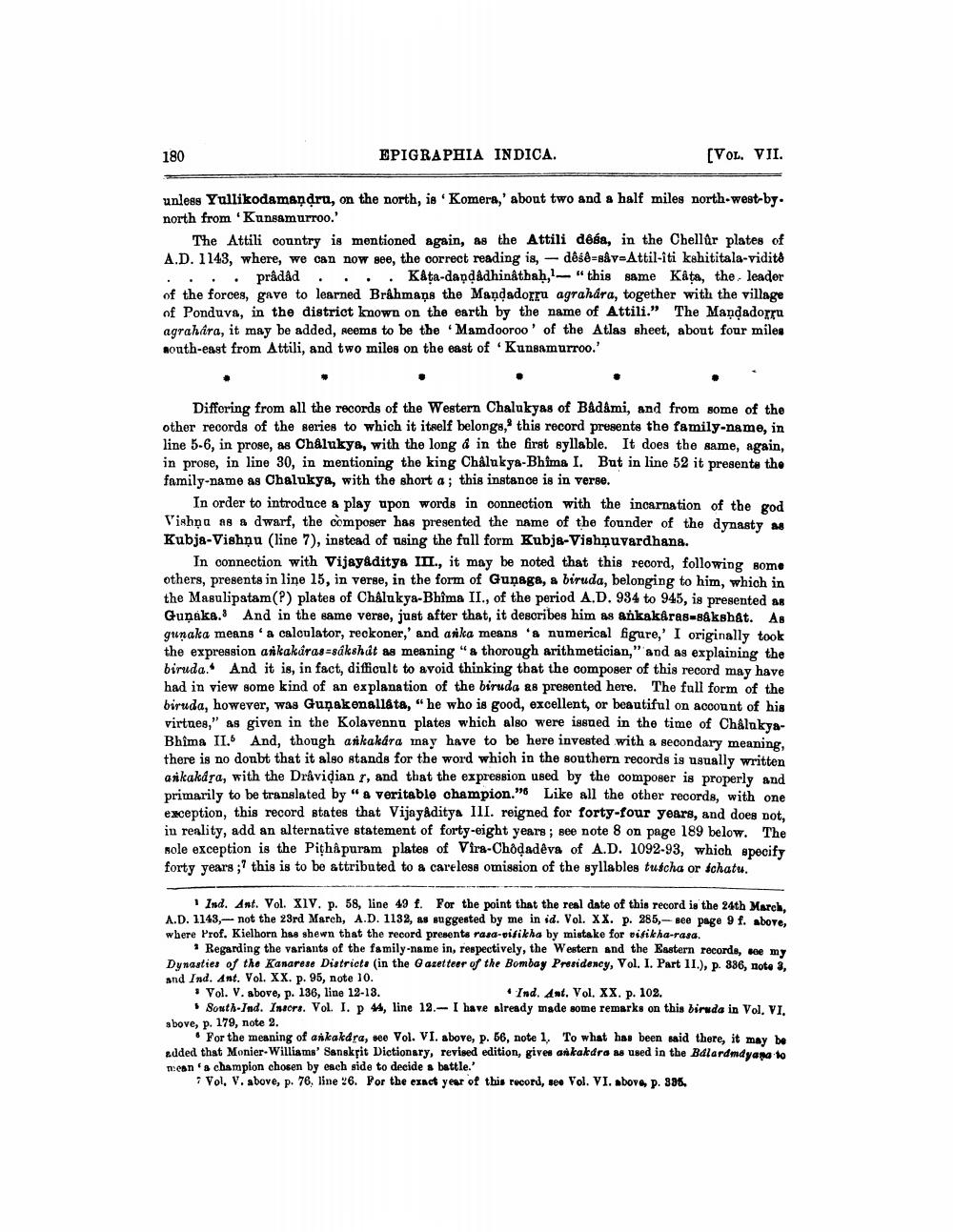________________
180
EPIGRAPHIA INDICA.
[VOL. VII.
unless Yullikodamaṇḍru, on the north, is 'Komera,' about two and a half miles north-west-by. north from 'Kunsamurroo.'
The Attili country is mentioned again, as the Attili désa, in the Chellûr plates of A.D. 1143, where, we can now see, the correct reading is, dêsê-sâv-Attil-iti kahititala-vidite prâdâd. .. Kata-dandadhinathaḥ, "this same Kâța, the leader of the forces, gave to learned Brahmans the Mandadorra agrahára, together with the village of Ponduva, in the district known on the earth by the name of Attili." The Mandadorru agrahara, it may be added, seems to be the Mamdooroo' of the Atlas sheet, about four miles south-east from Attili, and two miles on the east of Kunsamurroo.'
Differing from all the records of the Western Chalukyas of Bâdâmi, and from some of the other records of the series to which it itself belongs, this record presents the family-name, in line 5-6, in prose, as Chalukya, with the long & in the first syllable. It does the same, again, in prose, in line 30, in mentioning the king Chalukya-Bhima I. But in line 52 it presents the family-name as Chalukya, with the short a; this instance is in verse.
In order to introduce a play upon words in connection with the incarnation of the god Vishnu as a dwarf, the composer has presented the name of the founder of the dynasty as Kubja-Vishnu (line 7), instead of using the full form Kubja-Vishnuvardhana.
In connection with Vijayaditya III., it may be noted that this record, following some others, presents in line 15, in verse, in the form of Gunaga, a biruda, belonging to him, which in the Masulipatam(?) plates of Chalukya-Bhima II., of the period A.D. 934 to 945, is presented as Gunaka. And in the same verse, just after that, it describes him as ankakaras-sakshât. As gunaka means a calculator, reckoner,' and anka means a numerical figure,' I originally took the expression ankakaras-sakshat as meaning "a thorough arithmetician," and as explaining the biruda. And it is, in fact, difficult to avoid thinking that the composer of this record may have had in view some kind of an explanation of the biruda as presented here. The full form of the biruda, however, was Gunakenallata, "he who is good, excellent, or beautiful on account of his virtues," as given in the Kolavennu plates which also were issued in the time of ChalukyaBhima II. And, though ankakára may have to be here invested with a secondary meaning, there is no doubt that it also stands for the word which in the southern records is usually written ankakára, with the Dravidian r, and that the expression used by the composer is properly and primarily to be translated by "a veritable champion." Like all the other records, with one exception, this record states that Vijayaditya III. reigned for forty-four years, and does not, in reality, add an alternative statement of forty-eight years; see note 8 on page 189 below. The sole exception is the Pithapuram plates of Vira-Chodadêva of A.D. 1092-93, which specify forty years; this is to be attributed to a careless omission of the syllables tuscha or schatu.
1 Ind. Ant. Vol. XIV. p. 58, line 49 f. For the point that the real date of this record is the 24th March, A.D. 1143,- not the 23rd March, A.D. 1132, as suggested by me in id. Vol. XX. p. 285,- see page 9 f. above, where Prof. Kielhorn has shewn that the record presents rasa-visikha by mistake for visikha-rasa.
* Regarding the variants of the family-name in, respectively, the Western and the Eastern records, see my Dynasties of the Kanarese Districts (in the Gazetteer of the Bombay Presidency, Vol. I. Part 11.), p. 336, note 3, and Ind. Ant. Vol. XX. p. 95, note 10.
Vol. V. above, p. 136, line 12-13.
Ind. Ant. Vol. XX. p. 102.
South-Ind. Inscrs. Vol. I. p 44, line 12. I have already made some remarks on this biruda in Vol. VI. above, p. 179, note 2.
For the meaning of ankakdra, see Vol. VI. above, p. 56, note 1, To what has been said there, it may be added that Monier-Williams' Sanskrit Dictionary, revised edition, gives ankakdra as used in the Bdlardmdyana to mean 'a champion chosen by each side to decide a battle."
7 Vol. V. above, p. 76, line 26. For the exact year of this record, see Vol. VI. above, p. 335,




